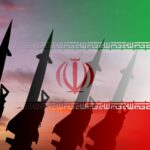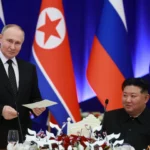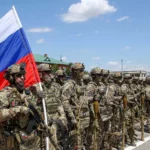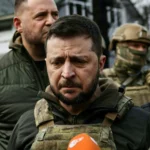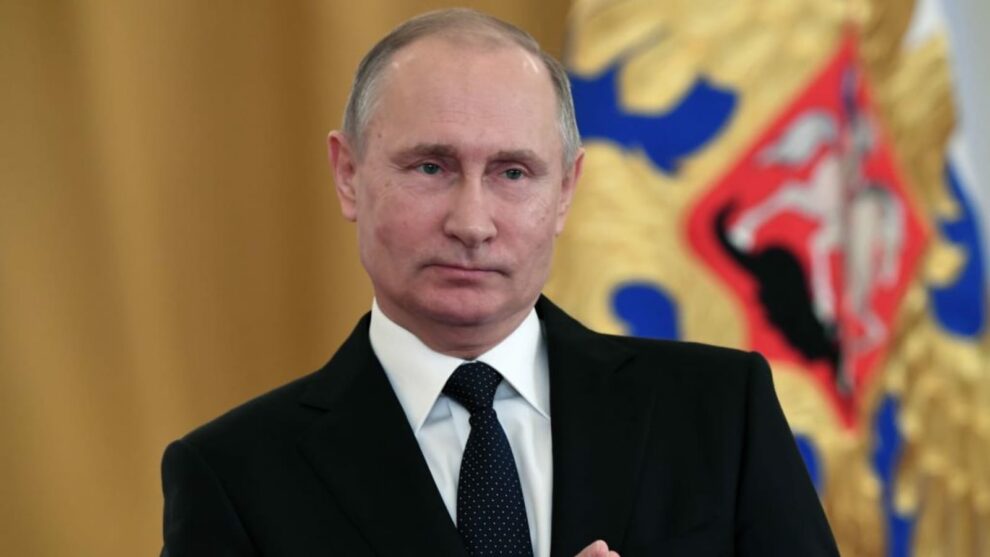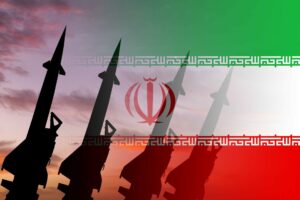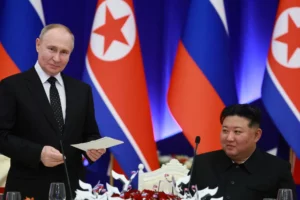It was the year that Vladimir Putin got lucky.
In 1999, Russia’s feared security service the FSB — formerly known as the KGB — had given Boris Yeltsin a list of names of who would be allowed to succeed him as president.
“He could choose, quote-unquote, whomever he wanted to be the next president of Russia,” says Russian historian Yuri Felshtinsky.
“But all three candidates who were presented to him were from the FSB.”
The way Felshtinsky tells the story in his new history of Russia’s secret services, From Red Terror to Terrorist State, former KGB operative Putin was on the bottom of the list.
“There was Primakov, who was former director of the SVR, Foreign Intelligence Service. There was Stepashin, who was former director of the FSK [another incarnation of FSB before its name was changed], and then there was Putin,” he tells the ABC.
In 1999, Yeltsin was coming to the end of his second term as president. The constitution — before Putin had it changed — prohibited him from running a third time.
The plan was for Yeltsin to resign before the end of his term and appoint the prime minister as acting president. Then the security services would have the inside running to get their man over the line to win the 2000 presidential election.
FSB candidate number one was Yevgeny Primakov, a former journalist with a keen interest in foreign affairs. But he had begun to upset the increasingly erratic and heavy-drinking Yeltsin.
According to Felshtinsky, Primakov “colluded with the State Duma and the communists and was dismissive of Yeltsin”.
There was talk of an impeachment and an unwillingness to provide guarantees that the president and his family would get immunity from corruption charges following his resignation.
Primakov was scrubbed from the list.
FSB candidate number two, Sergei Stepashin, upset Yeltsin as well, being seen as “willing to compromise with his competitors and enemies”.
He was cut from the list as well.
The last man standing was Putin, a former lieutenant colonel in the KGB who served in the secret service’s outpost of Dresden, East Germany during the Cold War before being appointed director of the FSB in 1998.
In August 1999, Yeltsin appointed Putin — a man who had never held elected office — as prime minister, in what was a shock to many outsiders.
As Matt Ivens, the editor of the Moscow Times, told British journalist John Sweeney the following year: “Yeltsin had been through a couple of prime ministers and each time he dropped them, he made it clear that it had something to do with elections.
“By the end, he’s picking Vladimir Putin. No-one has ever heard of Putin, except very careful watchers of politics or people from St Petersburg.
“He’s announcing, ‘this is my successor, this is a man who can run the country’, and there is widespread ridicule.
“All the newspapers in town including ours said, there’s no way this guy could win an election unless something really extraordinary is going to happen.”
The following month, something extraordinary did happen — a series of explosions ripped through four apartment blocks in Moscow, Buynaksk, Volgodonsk and Ryazan, killing over 300 people.
Blowing up Russia
The apartment bombings were considered Russia’s equivalent of 9/11. Putin blamed the attacks on terrorists from Chechnya and ordered air strikes on the republic’s capital, Grozny, the first stage of what became known as the Second Chechen War.
Fronting the media at the time, he promised to hunt down those responsible.
“We will pursue them everywhere,” he said in words that would reverberate around the country.
“We’ll wipe them out in the shithouse.”
Putin’s popularity began to climb. Within six months, he had turned the dire polls around and comfortably won the presidential election with nearly twice as many votes as his nearest rival, Gennady Zyuganov.
David Satter, an American journalist and historian who investigated the apartment bombings and was later expelled from Russia, believed they were carried out not by Chechen militants but by Russian security agents.
“I believe that Vladimir Putin came to power as the result of an act of terror committed against his own people,” he wrote.
“The evidence is overwhelming that the apartment-house bombings in 1999 … provided a pretext for the Second Chechen War and catapulted Putin into the presidency, were carried out by the Russian Federal Security Service [FSB].”
A year after the bombings, Felshtinsky flew to Moscow to meet a former FSB agent named Alexander Litvinenko.
The two had agreed to work on a book about the attacks that was eventually titled Blowing up Russia: Terror from Within.
“At the end of our conversation, which took several hours through the night of September 23-24, we agreed that he should escape from Russia and that we should finish the book together,” Felshtinsky tells the ABC.
“Although not a historian, as a high-level Cheka operative he contributed invaluable insight into the modus operandi of the FSB and added new facts from contacts.
“What was new was, we put all these disparate facts of August-October together as the campaign to remaster the unknown Putin into a Russian war hero over the dead bodies of Muscovites.”
One of the key pieces of evidence that emerged involved the arrest of FSB agents in Ryazan, south-east of Moscow, after the first four apartment bombings took place.
Vladimir Vasiliev, an engineer in Ryazan, was on his way home on the night of September 22 when he noticed three people acting suspiciously outside his apartment block. He called the police.
After the local constabulary arrived, a girl told them she had seen strangers leaving the basement.
Inspector Andrei Chernyshev went downstairs and found three sacks connected to what appeared to be a homemade detonator.
The bomb squad was called, an odourless explosive named Hexogen was identified inside the sacks and two FSB agents who had been seen near the apartment blocks were arrested.
Nikolai Patrushev, Putin’s successor as director of the FSB, soon made a hasty apology for the incident, explaining that the sacks were full of sugar and that it was merely an anti-terror training drill. The FSB agents were released.
Vasiliev was not impressed.
“Who can imagine such a thing?” he said to Satter.
“The claim that it was a test makes no sense. Does it make sense to test people for vigilance at a time when the whole country is in a state of panic?”
Putin later dismissed claims that he rode to power off the back of a series of FSB operations to blow up civilian apartment blocks as “utter nonsense”.
Some of those involved in investigating the allegations were killed in the aftermath.
In 2006, Litvinenko was poisoned by the radioactive isotope polonium-210 while drinking tea in London. He died a horrific, painful death.
An inquiry commissioned by the UK government found his death was a result of an FSB operation that was probably approved by Putin.
Yuri Shchekochikhin died suddenly in July 2003 just before he was due to meet with the FBI. The International Federation of Journalists believes he was poisoned.
Sergei Yushenkov, a Russian MP who was the co-chair of a commission set up to investigate the bombings and believed that they were the work of the FSB, was shot dead as he entered his apartment block in 2003.
Felshtinsky said he was warned by a former security agent, Mikhail Trepashkin, that the FSB had issued an order to kill both him and Litvinenko.
“Basically, we ignored it, because there was nothing that we could do,” he says.
The FSB takes over the presidency
Felshtinsky’s latest book is not just a history of Russian security services, it’s a history of its sustained attempts to take over the Russian state from 1918 onwards.
“They were trying to take power time after time after time,” he says.
“What happened in 2000 [with Putin’s election] was the final victory of the state security.”
Felshtinsky says that the way Russia now runs under Putin is like an FSB “collegium” — a term used for the administrative boards that flourished during the imperial reign of Peter the Great, and a system similar to the old Soviet Politburo, but run by security service acolytes, not communists.
“So, you have Putin, who is former director of the FSB, who is president. You have Patrushev, who is a former director of the FSB, who is in charge of the Security Council. And you have Bortnikov, who is the current director of FSB,” he says.
“We know, for example, that the decision to invade Ukraine in 2014 was made by [these] three people.”
US intelligence historian Calder Walton has described Russia as “effectively a security service with a state attached” where around 77 per cent of Putin’s administration has a background in either the intelligence agencies or the military.
It’s a self-sustaining system that Felshtinsky can’t see changing any time soon.
“The question is, who will be the next president of Russia and if the FSB will keep the power and I’m afraid the answer is, yes,” he says.
“So, from this point of view, it’s not really important whether this is Putin or somebody else. Because this is still a collective leadership.”
In modern-day Russia, political leaders who want genuine democratic reform, like Vladimir Kara-Murza and Alexei Navalny, languish in prison.
Both have survived poisoning attempts that have been linked to the FSB.
When asked why the Russian people accept a system where those who believe in free speech and free elections are imprisoned and the poisoners remain in power, Felshtinsky points to Russian history.
“Because Russia was never a democracy,” he says.
“It was a monarchy prior to 1917. It was a dictatorship prior to 1991. So, the period which Russia existed as a democracy was from 1991, probably to 1994, when Russia started the First Chechen War.
“So, Russians do not really know what democracy is. It’s not that they are missing it.”
As the full-scale invasion of Ukraine last year demonstrated, controlling the Russian people is not enough for Putin and the FSB.
Felshtinsky argues the president and his security state comrades have been trying to take back Ukraine since 1999.
“Ever since, like circling vultures, they have tried again and again to resurrect the Russian empire,” he says.
In 2005, during his state of the nation address, Putin described the collapse of the Soviet Union as “the greatest geopolitical catastrophe of the 20th century”.
Felshtinsky says that after Putin made that infamous speech, many in the West suggested that such views about Russia’s fallen empire should be respected or tolerated. The historian finds this perspective astounding.
“Let’s say today President Erdoğan stated that the collapse of Ottoman Empire was a major geopolitical catastrophe, and he would like to rebuild and recreate the empire.
“Or if the King of Britain said the collapse of the British Empire was a geopolitical catastrophe and he would like to get back the United States and India.
“We would probably send them to a mental institution, all of them.”
In March, the International Criminal Court (ICC) issued arrest warrants for Putin, indicting him for war crimes for the alleged involvement in the unlawful deportation of Ukrainian children into Russia.
The move has isolated the Russian president. If he visits a nation that is a signatory to the ICC, that country is obliged to arrest him and hand him over to the court.
Felshtinsky believes Putin fears he could end up in The Hague.
“He is afraid that his own comrades, as soon as he is not the president [will hand him over].
“I doubt they will send him to The Hague, because he knows too much. I don’t think that is going to happen, but that’s definitely what he’s afraid of,” he says.
Source : ABC News


